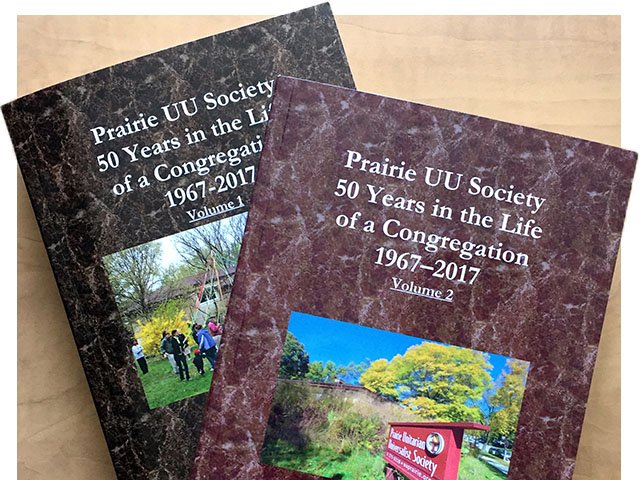Unitarian history
A new book tracks five decades of a Madison congregation
BY JAY RATH
June 13, 2019

CAROLYN FATH ASHBY
Not every history book includes chapters on blood drives, a cookbook fundraiser and spouse-swapping. These and other unlikely surprises are included in Prairie UU Society: 50 Years of a Congregation, 1967-2017.
It is the story of Madison’s Prairie Unitarian Universalist Society, in the Dunn’s Marsh neighborhood on the west side.
“We talked about it as being kind of a scrapbook, with something for everyone,” says Mary Mullen, who wrote it with Ruth Calden, Rosemary Dorney and Barbara Park, with contributions from congregants. “It’s Madison history, too.”
Unitarianism in the capital city goes back to 1879. Today, Madison has three congregations. The others are First Unitarian Society of Madison (in Shorewood Hills) and James Reeb Unitarian Universalist Congregation, near East High School.
“We like to talk about how you have the freedom of belief,” says Mullen, a retired teacher and state employee. “There are Christians in our church, there are Buddhists in our church, there are many former Catholics and people who grew up in mainstream Protestant religions.”
Prairie UU began as an offshoot when First Unitarian Society of Madison “was just crammed with people, especially children,” says Mullen.
Also, some members wanted leadership to take a hard stand against the Vietnam War. “They had been meeting in each other’s homes,” says Mullen. “It was kind of an alternative time.”
There were also concerns over the expense of maintaining First Unitarian Society’s building, designed by Frank Lloyd Wright and completed in 1951. And so the Prairie UU congregation was born. Mullen says the congregations separated on good terms, and First Unitarian Society even supported the new church financially for the first year.
The history is a massive 996 pages, split into two volumes, $37 for the set. It includes many member essays, profiles, lots of photos, and poetry. It is organized so that the reader can easily dip into any section at random. As in any small community, there’s high drama and low comedy.
Anyone who has ever served on a nonprofit cannot help but grimace in self-recognition while reading of Prairie UU’s “coffee wars.”
The ongoing crisis began in 1969, when the board addressed the issue of chatter in the coffee area disturbing congregants. After extensive discussion, according to the official minutes, “It was the feeling of the board that the hospitality committee should be allowed to experiment with the coffee arrangement after consulting with the program committee.”
In the groovy 1970s, a very Madison issue arose. Should the “ministering” committee be renamed “counseling committee”?
It turned into a serious matter. Because the congregation was small, some members worried that confidences could not be kept. This was especially important because of “intimate relations among members who are not married to one another,” according to board minutes. In short, this was the era of swinging.
The history drily notes, “at least 11 couples broke up as a result.”
The book grew out of a suggestion. In 2014, a friend of the congregation noted that the 50th anniversary was approaching and that the archives should at least be arranged.
Mullen recalls saying “Well we have to have a product. I don’t want to just sit and organize archives. What good is that?”
Prairie UU currently has around 100 members, and it has been in its current building since 1980. At its dedication, the Rev. Max Gaebler, of First Unitarian, spoke about the nature of a church. He also touched upon the importance of a church’s history.
“Out of the collective memory of the group, a memory stretching far back beyond its own particular beginning, and out of the shared hopes for the group — out of these things emerges that sense of linkage with ongoing adventure, that awareness of rootage which can endure.”
To purchase Prairie UU Society: 50 Years of a Congregation, 1967-2017, contact Mary Mullen at mmullen0843@gmail.com.
[Editor's note: This article was corrected to include the full name of the Shorewood Hills congregation: It is First Unitarian Society of Madison.]
[Archives Committee note: The years in the book title were corrected from 1967-1972 to 1967-2017. The Isthmus article is online here.]